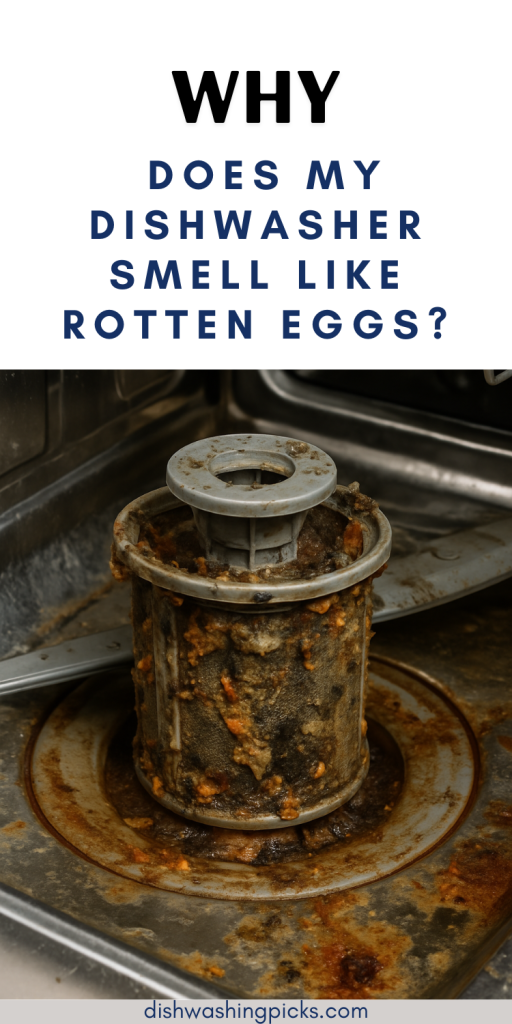
Okay, picture this: You open your dishwasher, expecting that fresh, clean scent or at least no smell at all, and bam — you get hit with that unmistakable rotten egg stench. Yikes. What’s going on? Is your dishwasher secretly a science experiment gone bad? Spoiler alert: it kind of is, but in a fixable way.
Let’s break down why your dishwasher smells like rotten eggs, what’s causing it, and how you can kick that nasty smell to the curb without breaking a sweat.
What’s That Smell Anyway? The Science Behind the Funk
So, what exactly is this rotten egg smell? It’s mostly caused by a gas called hydrogen sulfide — yeah, sounds fancy but it’s just a smelly gas produced by bacteria. These bacteria thrive in places that are warm, damp, and full of food scraps. In other words, your dishwasher’s secret little hangout spots.
Think of your dishwasher like a mini swamp. There are filters, crevices, seals, and drains where bits of food and grease get stuck and start to rot. Add in standing water (eww) and you have the perfect storm for bacteria to throw a smelly party.
Why Does This Happen? Common Culprits Revealed
You might be wondering, “Wait, doesn’t the dishwasher wash this stuff away?” Ideally, yes. But life isn’t always ideal. Here’s what usually causes that foul smell:
1. Food Gunk Left Behind
If you don’t scrape plates well or your dishwasher’s filter is dirty, leftover food bits hang around. Over time, this turns into a smelly biofilm—a slimy, gross layer where bacteria thrive.
2. Clogged or Slow Draining
Sometimes the drain hose or drain pump gets clogged or partially blocked. When water doesn’t drain fully, it sits and stagnates. Standing water equals bad smells. You don’t want a little pool of grossness at the bottom of your machine.
3. Dirty Filter That Needs Attention
Filters catch food crumbs and bits to keep your dishwasher running smoothly. But if you never clean that filter, it turns into a smelly trap. Cleaning this regularly is a game changer.
4. Mold & Mildew in Door Seals
The rubber seals around your dishwasher door can hold moisture and grime. That’s prime real estate for mold and mildew, which definitely contribute to that rotten egg stench.
5. Trouble With the Garbage Disposal
If your dishwasher drains into your garbage disposal (which most do), and your disposal is clogged or stinky, the smell can back up into your dishwasher. So sometimes it’s not your dishwasher’s fault!
So, How Do You Fix It? A Step-by-Step Smell-Busting Plan
Alright, now that we know what’s causing the problem, let’s talk solutions. The good news? Most of these fixes don’t require fancy tools or chemicals. Just some elbow grease and common household items.
Step 1: Clean the Filter
First things first — locate your dishwasher’s filter (usually at the bottom). Pull it out and rinse it under hot water. If it’s grimy, scrub it gently with a soft brush or old toothbrush. This alone can cut down on a lot of odor.
Step 2: Check and Clear the Drain
Next, check the drain area for any trapped food or debris. If water’s pooling at the bottom after a cycle, that’s a red flag. You might also want to inspect your drain hose for kinks or clogs. If you feel confident, disconnect and flush it with warm water.
Step 3: Wipe Down Door Seals and Edges
Grab a cloth soaked in vinegar or warm soapy water and wipe around the door seals, the edges of the door, and anywhere moisture likes to hide. Mold and mildew hate vinegar, so it’s a perfect natural cleaner.
Step 4: Run a Vinegar Cleaning Cycle
Fill a dishwasher-safe bowl with a cup of white vinegar and place it on the top rack. Run a hot water cycle. Vinegar breaks down grime, kills bacteria, and neutralizes odors.
Step 5: Baking Soda Refresh
Once the vinegar cycle finishes, sprinkle a cup of baking soda across the bottom of the dishwasher and run a short hot cycle. This deodorizes and removes stains. Bonus: it leaves your dishwasher smelling fresh!
Pro Tips to Keep the Smell Away for Good
Cleaning your dishwasher once is great, but what about keeping it fresh long-term? Here’s some easy daily and weekly habits:
- Scrape Plates Well: No need to rinse perfectly, but scraping big chunks helps reduce buildup.
- Run Hot Cycles Regularly: Use the hottest setting once a week or so to keep bacteria in check.
- Leave the Door Ajar: After a cycle, leave the dishwasher door slightly open to air it out. Moisture breeds bacteria and mold.
- Clean the Filter Monthly: Make it a habit. It’s the key to preventing nasty odors.
- Inspect Garbage Disposal: If your dishwasher drains there, keep the disposal clean and fresh.
Wrapping It Up: Your Dishwasher Deserves Some Love
Nobody wants to open their dishwasher and get a whiff of rotten eggs. It’s gross, and honestly, it can ruin your whole kitchen vibe. But now you know why it happens and how easy it is to fix. A little regular cleaning, some vinegar, baking soda, and a bit of TLC will keep your dishwasher smelling fresh and working great.
So, next time you’re putting away dishes, take a peek inside and maybe give your dishwasher a mini spa day. Trust me, future you will thank you.
And hey—got any funny dishwasher stories or weird kitchen smells you’ve battled? I’m all ears! Sharing those little household battles is half the fun.
